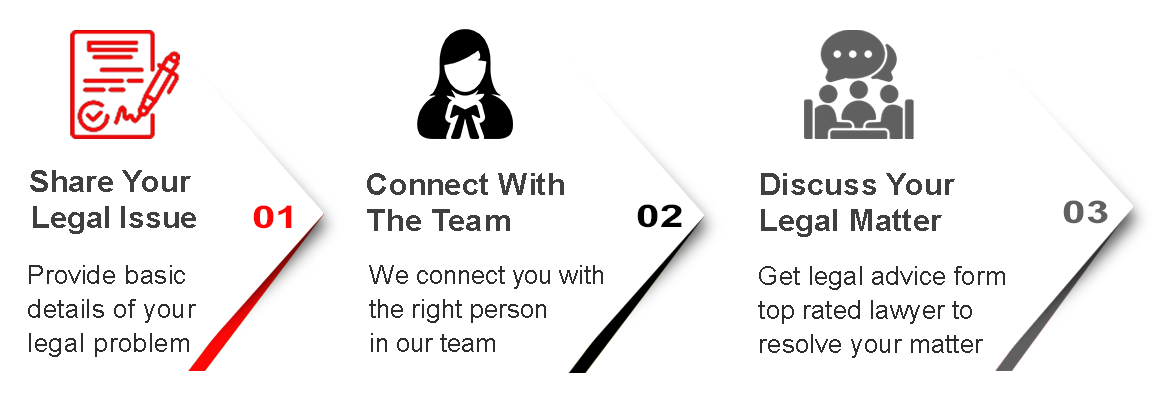Expert Legal Help for Family Issues
Talk to a Verified Lawyer for Divorce, Child Custody, Domestic Violence & Marriage Registration.
What is family dispute?
Family law is a broad area of law that plays an important role in resolving issues that families may encounter and navigate the complexities that may occur. It impacts the lives of an individual and their families all around the nation. It covers wide range of rules and regulations in respect of different communities like Hindu, Muslim, and Christian and each of the communities have different their own law and statues. Basically, family law safeguards the rights and wellbeing of an individual and families all over India. It covers various aspects like:
Divorce:
Divorce is a legal dissolution of marriage between husband and wife. The divorce can be mutual or contested. In mutual divorce both the partners agrees to end up their marriage by mutual consent, whereas in contested divorce partners do not agree to end up their marriage mutually. It is essential to consult an expert lawyer who will assist you with the best course of action through divorce proceedings.
Child Custody:
The primary goal of court is to ensure the child’s best interest. Basically, the legal rights and obligations parents have with relation to the upbringing and care of their children are referred to as child custody. The custody can be granted to physically, jointly or legally. If both the parents deem unfit to raise their child then the custody is granted to child guardian or foster care agency.
Domestic Violence:
Domestic violence is heinous crime in India and is a serious issue which affects the life of an individual. The abuse can be physical, sexual, emotional, and financial. The victim of domestic violence has legal right to get protection order, residence order, and monetary benefit and can also file a police complaint under Protection of Women from Domestic Violence Act, 2005
Adoption:
Adoption is a legal process in which a married couple or a single woman takes whole responsibility of a child from his biological parents, therefore become permanent legal parent. Mainly, adoption is governed by Hindu Adoption and Maintenance Act, 1956 which safeguards the right of adoptive child.
Marriage Registration:
The partners are provided legal rights, such as inheritance, support claims, and property rights, when their marriage is registered. The marriage registration in India is mostly followed by:
- Hindu Marriage Act, 1955, in which the marriage is registered between same castes people and basically it is made for Hindi, Buddhism, Jain and Sikhs.
- Special Marriage Act, 1954, in which the marriage is registered between people of different caste.
Maintenance and Alimony:
Maintenance is type of financial support which is granted to an individual who is unable to fulfill basic needs. The wives, children and old parents are entitled to get maintenance under section 144 of Bharatiya Nagrik Suraksha Sanhita, 2023. The amount of maintenance is decided by the court on the basis of capacity of person who is required to pay.
Inheritance and Succession:
The transfer of person’s assets, property and wealth to the legal heir after the death of aggrieved person, is known as inheritance, whereas succession is transfer of ownership within a business. It is governed by Hindi Succession Act 1956, Indian Succession Act 1925 and Muslim law of Inheritance.
Uniform Civil Code:
Uniform civil code is a set of laws enforced by government which is applicable to all in uniform way irrespective of their religion for the issues related to marriage, divorce, inheritance, maintenance and adoption.
Apart from these laws, some other family law includes paternity and maternity rights, Prenuptial and Postnuptial Agreements, marriage annulment, reproductive and sexual rights, and child protection laws. Each factor requires a thorough analysis and an expert legal assistance to navigate the complexities of issues related to family law. Lead India Law ensures best course of action and provide a lawyer who will resolve the family related matter in efficient and effective way.
Popular Lawyers
View allOur Client Testimonials
Frequently Asked Questions (FAQs)
Q. Why mutual divorce is better than contested divorce?
Ans. Mutual divorce is considered better because it is more amicable, less stressful, speedy process and less expensive as compared to contested divorce.
Q. How child custody is decided?
Ans. Child custody is decided, based on the best interest of child by considering the main factors like health, age and emotional well-being of child. Moreover, the financial stability of parent is also considered.
Q. What is process of adoption in India?
Ans. The adoption process is governed by Hindu Adoption and Maintenance Act, which involves registering with the adoption agency, conducting a home study, matching with a legally free child and getting an adoption order after pre adoption foster care.
Q. What is marriage annulment?
Ans. Marriage annulment means legally cancellation of marriage, which never existed in eye of law. These marriages should be performed due to factors like, fraud, force, bigamy, and impotency.
Q. How the amount of maintenance and alimony is decided?
Ans. The amount of maintenance and alimony is decided based on the financial stability of person, along with the needs and standard of living of other person receiving maintenance.
Q. What is benefit if marriage registration?
Ans. The registration of marriage provides legal rights, such as inheritance, support claims, social security and property rights.
Q. Can a couple have a prenuptial or postnuptial agreement in India?
Ans. The couple may create a prenuptial or postnuptial agreement in India, but they are not legally binding under current law due to lack of concerned legislation.
Q. How can woman seek assistance against domestic abuse?
Ans. The woman may seek legal protection from police and can claim protection order, residential order and monetary benefit under Protection of Women from Domestic Violence Act, 2005.
How Lead India can help you?

24x7 Help
If we fall short of your expectation in any way, let us know
Payment Trust
All refunds come with no questions asked guarantee



